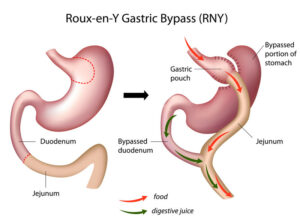Laparoscopic Gastric Bypass
A laparoscopic Gastric bypass is an operation to create a new stomach pouch and bypass. This means that food does not need to go through the stomach. It is achieved by grafting (attaching) a piece of intestine onto the pouch so that food passes through the pouch and down the bypass.
It is performed for helping very overweight patients achieve substantial and permanent weight loss. This is because it restricts both the amount that someone can eat and reduces appetite.
The operation is carried out laparoscopically, which is also known as keyhole surgery. This means that the surgeon makes five small incisions (cuts) in the abdomen (belly) to get to the stomach. The surgeon may decide to convert to an open procedure (the traditional way of carrying out operations through a longer incision) if they think it would be safer.
What does the operation involve?

A gastric bypass is an operation to create a new stomach pouch and bypass. It is achieved by grafting (attaching) a piece of intestine onto the pouch so that food passes through the pouch and down the bypass.
The most common type of bypass procedure is the “Roux-en-y”. This involves the bariatric surgeon creating a small stomach pouch by stapling part of the stomach together or vertical banding, which reduces the patient’s appetite and capacity for food.
Then a Y-shaped section of the small intestine is attached to the pouch to allow food to bypass the duodenum as well as the first portion of the jejunum. This reduces the body’s absorption of food so that fewer calories are being used.
The operation takes approximately two hours. For some patients, the surgery can be technically difficult depending on body-build or previous surgery. In these circumstances the operation can take longer. Before the operation you’ll come into hospital on the day of surgery and will wear anti-embolism socks (like very tight stockings) to prevent blood clots forming in your legs. The anaesthetist will see you before or on the morning of surgery.
Benefits of gastric bypass surgery
This surgery is a proven method of weight loss. When combined with a supervised diet, increased activity and behaviour modification, it can lead to long-term weight loss and the associated health benefits.
Weight loss is more than with non-surgical programmes alone and can be more than other gastric bypass surgery. Average excess weight loss is 60 to 70% (for example, if a patient is 10 stone over weight then we would expect him/her to lose on average 6 to 7 stone).
As a result of the combined effects of weight loss and surgery many obesity related diseases such as high blood pressure, Type 2 Diabetes Mellitus, sleep apnoea and many others go in to remission.
We feel it is important for patients to have a clear view of the commitments and risks associated with this surgery. However, these have to be balanced against the longer-term risks of remaining severely overweight. We advise that you discuss these issues carefully with your surgeon at the time of your consultation.
